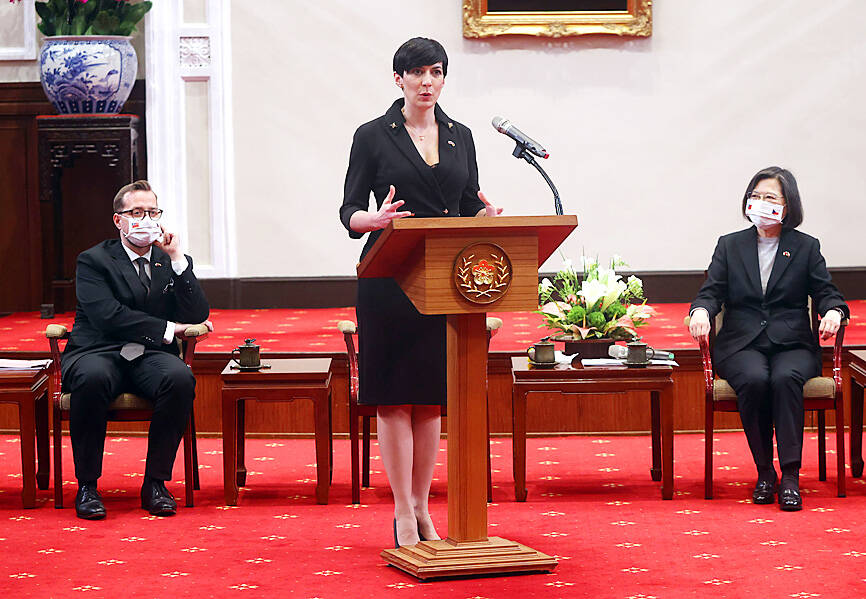The Czech Republic supports Taiwan’s international participation and is determined to consolidate long-term cooperation with the nation, Czech Chamber of Deputies Speaker Marketa Pekarova Adamova said yesterday during a meeting with President Tsai Ing-wen (蔡英文).
Adamova is leading a 160-member delegation on a five-day visit to Taiwan until tomorrow to “show support for Taiwan’s democracy,” she said.
The Czech Republic is looking to expand and deepen cooperation with Taiwan to bring benefits to both sides as well as third parties, she added.

Photo: CNA
This year marks the 30th anniversary of the Czech Economic and Cultural Office in Taipei, celebrating close and stable relations between the two nations, Adamova said.
Taiwan is the Czech Republic’s priority democratic partner in Asia, she said, adding that “peace and stability across the Taiwan Strait is the necessary condition for security and prosperity in the world.”
She voiced support for Taiwan’s efforts to join the WHO, the International Civil Aviation Organization and other international bodies, as the nation “has the right to share its expertise and learn from other countries.”
Shared values, most importantly freedom, democracy and human rights, can help the two nations withstand pressure from the outside, Adamova said.
She said she was delighted by the news that China Airlines Ltd (中華航空) would offer twice-weekly direct flights between Taiwan and Prague starting in July, adding that the route would be beneficial to both nations.
Tsai thanked Adamova for visiting Taiwan despite ongoing pressure from China, calling the trip “an important milestone for the Taiwan-Czech relationship.”
After speaking on the telephone with Czech President Petr Pavel, the two leaders believe that Taiwan and the Czech Republic can boost cooperation in all fields based on their friendly ties, she said.
Many Taiwanese businesses have shown an interest in investing in the Czech Republic after the Central and Eastern Europe Investment Fund was established last year, which indicates that more cooperation between the two sides can be expected, she added.
In related news, the Czech Hub in Taiwan opened yesterday to promote cooperation between companies, academic institutions, start-ups, cultural institutions and non-governmental organizations in Taiwan and the Czech Republic.
The hub, which was established by the European Values Center for Security Policy Taiwan Office and the Czech-Taiwanese Business Chamber with the support of the Ministry of Foreign Affairs, would serve as a platform for Czech and Taiwanese partners in various fields, Adamova said at the opening ceremony.
The Czech Republic “would like to become Taiwan’s best friend in Europe,” she said, calling on other nations to set up similar hubs in Taiwan to boost ties with the nation.
As European nations are seeking to reduce their reliance on Beijing, working with Taiwan, a democratic nation with a free market, has become an attractive option, Deputy Minister of Foreign Affairs Roy Lee (李淳) said.
While breakthroughs in official relations between Taiwan and European nations are difficult to predict, there would be more opportunities for Europe to deepen and broaden cooperation with Taiwan, he said.

AIR SUPPORT: The Ministry of National Defense thanked the US for the delivery, adding that it was an indicator of the White House’s commitment to the Taiwan Relations Act Deputy Minister of National Defense Po Horng-huei (柏鴻輝) and Representative to the US Alexander Yui on Friday attended a delivery ceremony for the first of Taiwan’s long-awaited 66 F-16C/D Block 70 jets at a Lockheed Martin Corp factory in Greenville, South Carolina. “We are so proud to be the global home of the F-16 and to support Taiwan’s air defense capabilities,” US Representative William Timmons wrote on X, alongside a photograph of Taiwanese and US officials at the event. The F-16C/D Block 70 jets Taiwan ordered have the same capabilities as aircraft that had been upgraded to F-16Vs. The batch of Lockheed Martin

GRIDLOCK: The National Fire Agency’s Special Search and Rescue team is on standby to travel to the countries to help out with the rescue effort A powerful earthquake rocked Myanmar and neighboring Thailand yesterday, killing at least three people in Bangkok and burying dozens when a high-rise building under construction collapsed. Footage shared on social media from Myanmar’s second-largest city showed widespread destruction, raising fears that many were trapped under the rubble or killed. The magnitude 7.7 earthquake, with an epicenter near Mandalay in Myanmar, struck at midday and was followed by a strong magnitude 6.4 aftershock. The extent of death, injury and destruction — especially in Myanmar, which is embroiled in a civil war and where information is tightly controlled at the best of times —

Taiwan was ranked the fourth-safest country in the world with a score of 82.9, trailing only Andorra, the United Arab Emirates and Qatar in Numbeo’s Safety Index by Country report. Taiwan’s score improved by 0.1 points compared with last year’s mid-year report, which had Taiwan fourth with a score of 82.8. However, both scores were lower than in last year’s first review, when Taiwan scored 83.3, and are a long way from when Taiwan was named the second-safest country in the world in 2021, scoring 84.8. Taiwan ranked higher than Singapore in ninth with a score of 77.4 and Japan in 10th with

SECURITY RISK: If there is a conflict between China and Taiwan, ‘there would likely be significant consequences to global economic and security interests,’ it said China remains the top military and cyber threat to the US and continues to make progress on capabilities to seize Taiwan, a report by US intelligence agencies said on Tuesday. The report provides an overview of the “collective insights” of top US intelligence agencies about the security threats to the US posed by foreign nations and criminal organizations. In its Annual Threat Assessment, the agencies divided threats facing the US into two broad categories, “nonstate transnational criminals and terrorists” and “major state actors,” with China, Russia, Iran and North Korea named. Of those countries, “China presents the most comprehensive and robust military threat